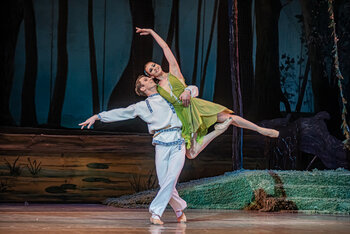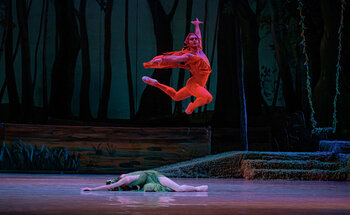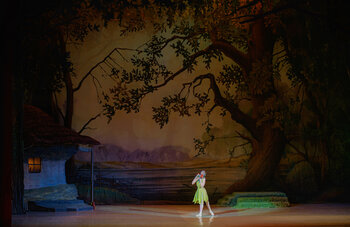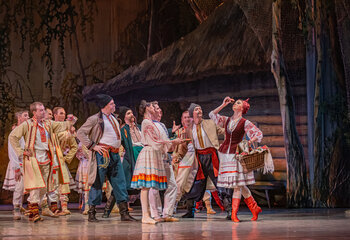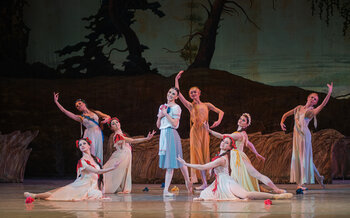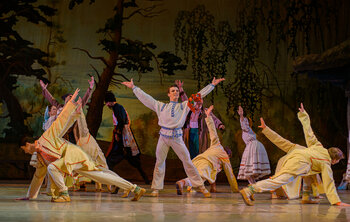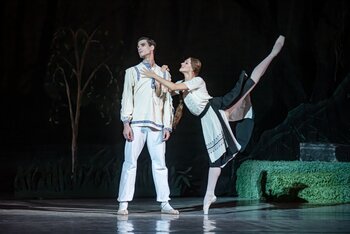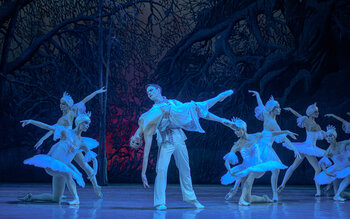Upcoming shows
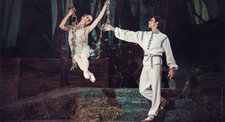
- Musical director of the performance:
- Volodymyr KOZHUKHAR
- Choreographer:
- Vakhtang VRONSKY
- Scenographer:
- Anatolii VOLNENKO
- Conductor:
- Allin VLASENKO
- Choreographer of the renewal:
- Viktor LYTVYNOV
- Artist of the renewal:
- Maria LEVYTSKA
- Costume Designer of the renewal:
- Natalia KUCHERYA
- Rehearsal Coaches:
- Liudmyla ZHITNIKOVA
- Mykola MIKHEIEV
- Concertmasters:
- Oksana GOROBIIEVSKA
- Svitlana TERENTIEVA
- Director who leads the performance:
ABOUT THE BALLET "THE FOREST SONG"
In the musical heritage of Myhailo Skorulsky (1887-1950), the ballet "The Forest Song" occupies a special place.
The composer was captivated by the plot of the wonderful poetic drama-extravaganza of Lesia Ukrainka's “The Forest Song” - one of the most outstanding works of Ukrainian literature, captivating with its humanism, high ethical pathos, imbued with passionate faith in the poetry of life and the immortal pursuit of beauty. In “The Forest Song” the condemnation of pettiness, greed, and selfishness sounded angrily and passionately - all of which kill a person's creative burning and sense of joy. Lesia Ukrainka contrasted the narrow-minded understanding of full living with the high dream of happiness, the true greatness of the human soul.
It was no coincidence that the poetess called the work a drama-extravaganza. Fairytale miracles and allegories are closely intertwined in it with the truth of deep human feelings. The main philosophical idea of “The Forest Song” is embodied through the complex image of the talented and kind country boy Lukash, endowed with the sensitive heart of a poet and dreamer. In his sincere love for Mavka, rapprochement with nature, and his passion for music, his spiritual wealth and artistic talent are revealed. Lukash's submission to the selfish demands of his relatives, his betrayal of Mavka, and his marriage to the "earthly", mired in Kilina's routine, kill his creative inspiration and all that is bright in his tender soul.
Lesia Ukrainka very warmly described the image of Mavka - a fantastic forest girl, personifying the beauty of nature. The appearance of Lukash arouses in Mavka feelings that at that time were unknown to her, a forest creature. They bring deep happiness and at the same time heavy grief.
The Forest Song was created in 1911, when Lesia Ukrainka was forced to live in Kutaisi due to a serious illness. Far from Ukraine, the poetess wrote a work imbued with the charms of her native nature, memories of those days when she was still listening to Volyn legends and traditions as a girl.
The work brought to life the mythological images of folk tales and myths, creatures of spiritual nature, which folk fantasy had settled in the ancient Volyn forests and vast fields.
The libretto of the ballet “The Forest Song” was written by the composer's daughter, a former famous ballerina, Honored Artist of Ukraine Natalia Mikhailovna Skorulska (1915-1982). The authors of the ballet set their task to most accurately convey the content of Lesia Ukrainka's work, to recreate the emotional color in music and choreography, and to preserve the main images and plot situations as well as the internal logic and the sequence of dramatic development in which the real is intertwined with the fairytale-like.
However, like any literary work, "The Forest Song" could not be "translated" into musical and choreographic language without proper adaptation to the laws of the ballet genre. With poetic image, philosophical generalizations of the drama had to be given a specific visual form, harmoniously and concisely reproducing the development of the action. From this came the necessary reductions to the fundamental literary text, the removal of a number of episodes and vice versa - the expansion of individual episodes and even the introduction of new scenes.
The music of M. Skorulsky is indicated by emotional fullness and juicy orchestral colors. Profound melody, lyricism, romantic inspiration - these are the dominant features of the ballet score.
In the musical fabric of "The Forest Song", folk motifs occupy a significant place. Myhailo Skorulsky paid great attention in particular to the musical folklore of Volyn. It should be noted that a little can be found in Ukrainian (and not only Ukrainian) ballet pieces, saturated with such convincing musical characteristics as in “The Forest Song”.
The central place in the music is alloted to the embodiment of the deep experiences of Mavka and Lukash, the transfer of their feelings and moods. The fairy-tale-fantastic moments, musical pictures of nature, and divertissement episodes are subordinated towards this goal.
Working on the ballet, Myhailo Skorulsky created a fascinating anthem not only for man with his eternal desire for beauty, but also for nature and life. "The Forest Song" was completed by M. Skorulsky in 1936. The ballet was staged by the Kyiv Opera and Ballet Theater. Lesia Ukrainka's embodiment of the drama-extravaganza by choreographic means interested the general public: notices of work on a new production began to appear in the press, as well as of the possibilities and paths to its stage embodiment. But the Great Patriotic War did not allow the completion of a new ballet production at the time. Only after the liberation of Kyiv did it become possible to continue working on "The Forest Song".
The premiere of "The Forest Song" took place on February 1946 during the celebration of the 75th anniversary of the birth of Lesia Ukrainka. The performance was staged by choreographer Sergiy Sergeev, conductor Boris Chistyakov, artist Alexander Khvostenko-Khvostov. The first performers of the parts of Mavka and Lukash were Antonina Vasilyeva and Alexander Berdovsky. In 1958, the theater returned to the ballet of Myhailo Skorulsky. The new interpretation was made by People's Artist Vakhtang Vronsky with the participation of Honored Artist of Ukraine Natalia Skorulska. The scenery was created by the famous artist Anatoliy Volnenko.
In this choreographic incarnation of "The Forest Song", both S. Sergeev and V. Vronsky went the route of combining elements of classical and Ukrainian folk dances as well as realistic and fantastical images. The performance drew in through the expressiveness of its characters, romance, and the poetic inspiration of its dances.
The Shevchenko stage knew three more readings of the immortal ballet classic - in 1972 (renewal by N. Skorulska), in 1986 (renewal by V. Kovtun) and in 1991 (renewal by V. Lytvynov). It was on the basis of the latest update in 1991 that the Japanese company "NHK" made the video "The Forest Song".
During the long stage history of the ballet, which was included in the golden fund of Ukrainian musical culture, the leading parts were performed by the best Ukrainian dancers: Yevheniya Yershova, Olena Potapova, Alla Gavrilenko, Iraida Lukashova, Tetyana Tayakina, Raisa Khilko, Lyudmila Smorgacheva, Mykola Aptukhin, Anatoly Belov, Gennadii Baukin, Fedor Baklan, Robert Klyavin, Veanir Kruglov, Valery Kovtun, Sergei Lukin, Valery Parsegov, Nikolai Pryadchenko and others.

